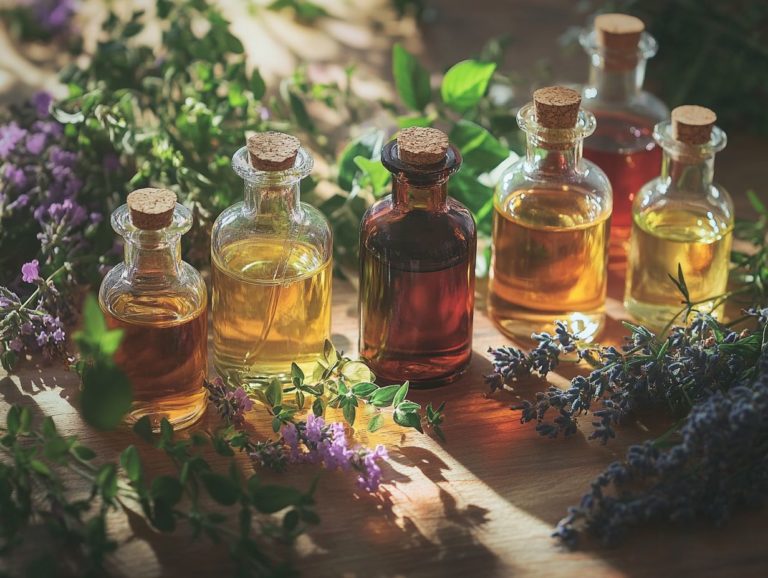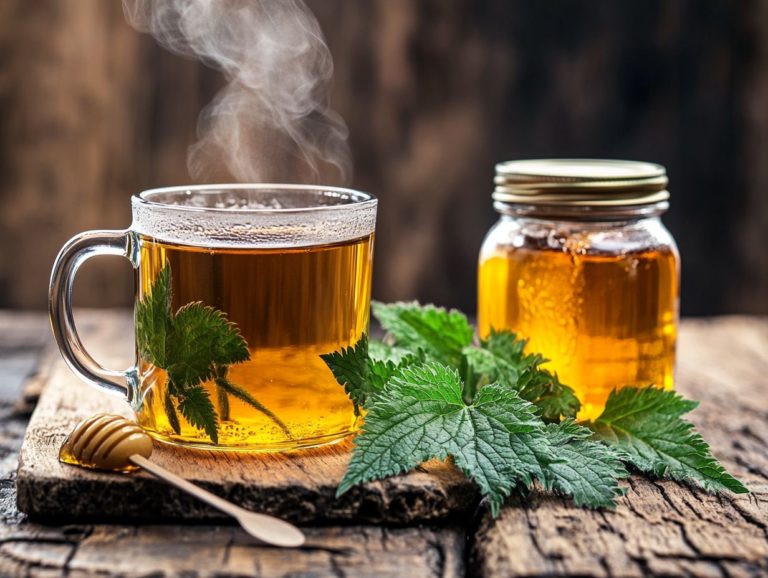Herbs for Bone Health: What to Consider
Maintaining strong bones is vital for your overall health, and you may not know that herbs can significantly contribute to this essential aspect of well-being.
Explore a variety of herbs known for their bone-boosting benefits, uncovering how each one plays a role in enhancing bone health. You will discover practical tips and delicious recipes to easily integrate these powerhouse plants into your daily diet.
Stay informed now to keep your bones strong for years to come! Always check with your doctor first about potential interactions and when to seek guidance.
Dive in to uncover natural ways to strengthen your bones!
Contents
- Key Takeaways:
- Common Herbs for Bone Health
- How to Incorporate Herbs into Your Diet
- Potential Risks and Side Effects
- Consulting with a Healthcare Professional
- Frequently Asked Questions
- Looking for herbs to boost your bone health?
- Can herbs replace traditional medication for bone health?
- Are there any herbs to avoid for bone health?
- How can I incorporate herbs into my bone health routine?
- Are there any side effects of using herbs for bone health?
- Is it safe to use herbs for bone health during pregnancy or breastfeeding?
Key Takeaways:
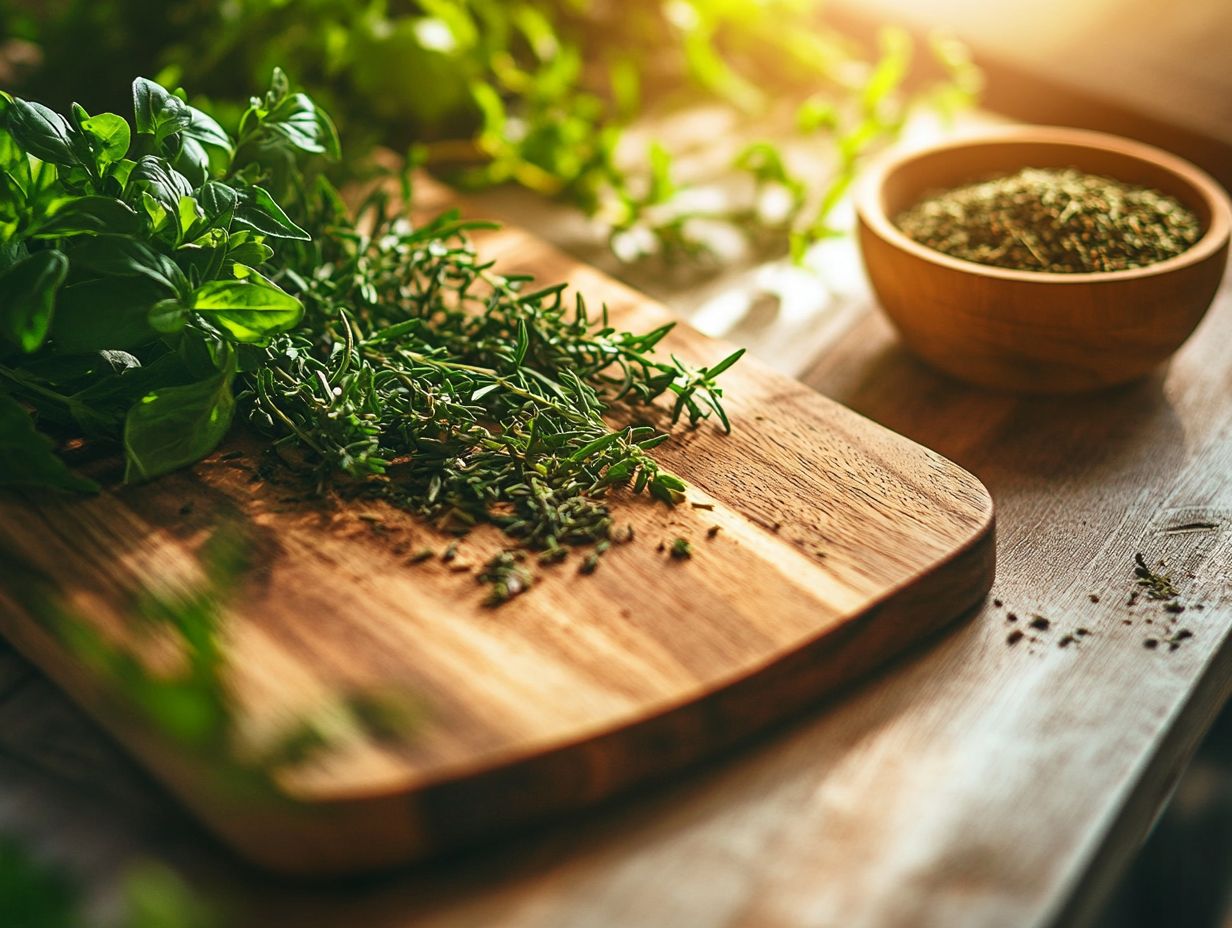
Consider adding herbs into your diet for their benefits in improving bone health. Commonly used herbs include turmeric, ginger, and garlic. Each has unique benefits, such as reducing inflammation and increasing bone density. Always consult with a healthcare professional before adding herbs, as they may interact with medications or have potential side effects.
Why Herbs are Beneficial for Bone Health
Herbs play a crucial role in promoting bone health, especially when it comes to tackling osteoporosis and other bone-related issues.
With their rich array of nutrients and antioxidants, natural ingredients like dandelion, red clover, and horsetail extract can enhance your body s ability to build bone while potentially reducing the risk factors associated with calcium deficiency.
The natural ingredients in these wellness herbs, such as curcumin from turmeric, offer anti-inflammatory benefits and support the activity of osteoblasts cells that help build bone.
Incorporating these herbs into your diet can effectively bolster calcium intake and provide vital nutrients, such as vitamin K, critical for preventing bone demineralization.
A study published in the Journal of Bone and Mineral Research even highlighted how adding herbs to the daily diet improved mineral density in postmenopausal women, showcasing their potential as a proactive strategy against osteoporosis.
By blending these natural remedies with traditional nutritional practices, you may discover greater resilience in your bone health. As ongoing research continues to reinforce the benefits of herbal solutions, their promise in strengthening bones and enhancing overall well-being becomes increasingly compelling.
Common Herbs for Bone Health
A diverse array of common herbs has been recognized as effective natural treatments for enhancing bone health, each possessing distinct properties that contribute to robust bones.
Dandelion, often dismissed as a mere weed, is actually a nutritional powerhouse bursting with vitamins and minerals.
Horsetail stands out for its impressive silica content, vital for bone formation and repair. Meanwhile, red clover provides beneficial natural compounds, and dried nettles are rich in essential nutrients, making them esteemed selections in herbal medicine for fortifying your bones.
Key Herbs and Their Benefits
Key herbs such as dandelion, horsetail, red clover, and dried nettles distinguish themselves with remarkable health benefits, particularly regarding bone health.
These herbs offer a well-rounded approach to enhancing both bone density and strength. Take dandelion; it delivers a potent dose of antioxidants and aids in your body s absorption of calcium a crucial element for maintaining bone integrity.
Research highlights that horsetail’s impressive silica content plays a key role in promoting collagen production, which supports bone repair and maintenance. Likewise, studies suggest that red clover’s soy isoflavones may assist in mitigating post-menopausal bone loss, reinforcing its significance in women’s skeletal health.
Dried nettles, rich in calcium, support optimal bone mineralization. Together, these herbs work synergistically to bolster bone health, making it essential to weave them into your balanced diet.
Incorporate these herbs into your lifestyle today for immediate benefits!
How to Incorporate Herbs into Your Diet
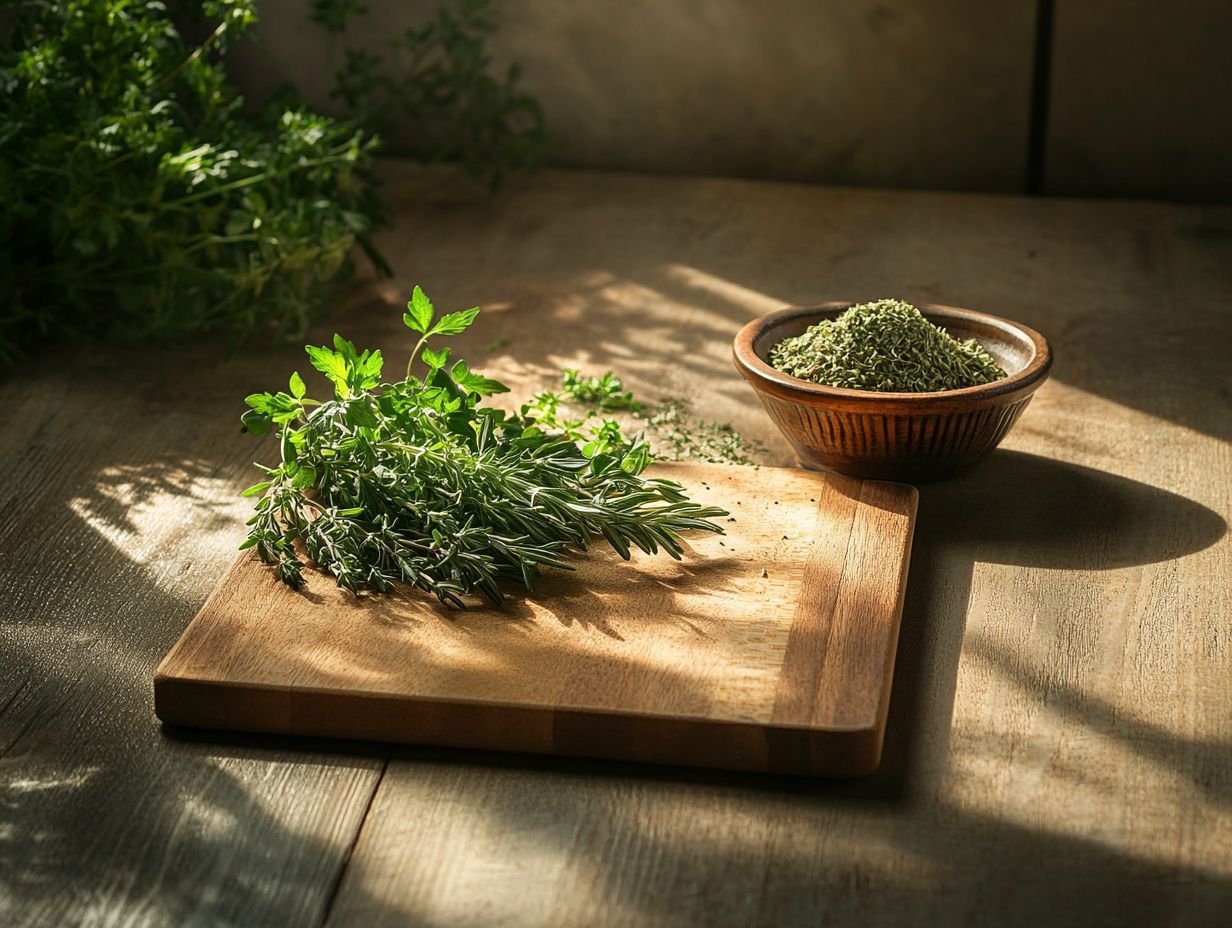
Incorporating herbs into your diet is a flavorful journey and a savvy choice for supporting bone health. With a diverse array of options tailored to every palate, you can transform your meals.
Consider using dried nettles as a seasoning or adding fresh dandelion shoots to your salads. The cooking options are both accessible and delightful.
A trip to your local health food store can lead you to high-quality medicinal herbs and dietary supplements, allowing you to fully embrace the benefits of these natural remedies.
Recipes and Tips for Using Herbs
Try herbs like dandelion, horsetail, and red clover today for greater flavor and nutrition! Saut dandelion greens or blend them into smoothies. Horsetail can be added to soups and teas, delivering both delightful taste and essential nutrients.
These herbal remedies can seamlessly weave into your cooking, offering a simple yet effective approach to enhancing your daily diet.
Incorporating these herbs into your meals provides an excellent source of vitamins and minerals, which are crucial for maintaining healthy bones. Dandelion is rich in vitamin K, which helps your body absorb calcium. Horsetail provides silica, essential for strong collagen production.
When preparing these herbs, aim for organic options whenever possible, as they tend to retain more nutrients. Store them in a cool, dry place, and consider drying them for an extended shelf life. For maximum benefits, lightly steaming or using them fresh in salads helps preserve their nutrients, allowing you to savor both their flavor and health advantages.
Potential Risks and Side Effects
While herbal treatments can provide a wealth of benefits for your bone health, stay aware of potential risks and side effects that may accompany their use.
Certain herbs, such as red clover and dandelion, have the potential to provoke allergic reactions or interact with specific medications, especially blood thinners or hormone therapies.
Therefore, consulting with healthcare professionals before incorporating these supplements into your regimen is crucial. This ensures that you approach the enhancement of your bone strength safely and effectively.
Interactions and Precautions
Understanding the interactions and precautions essential for incorporating herbal health remedies into your regimen is crucial, especially if you have osteoporosis or other health conditions. Certain herbs can interact with conventional medications, potentially reducing their effectiveness or leading to harmful side effects.
Being informed about potential interactions particularly with blood-thinning medications or hormone treatments is vital for safely reaping the health benefits of these natural compounds.
For example, herbs like ginkgo biloba, garlic, and ginger can amplify the effects of anticoagulants, while St. John’s Wort may compromise the efficacy of antidepressants. Exercise caution with supplements such as ginseng and ephedra, as they could adversely interact with various drugs.
To navigate these risks effectively, consult with your healthcare provider before embarking on any herbal treatment. Keep a detailed list of all medications and supplements you re taking, and stay vigilant for any unexpected side effects. Maintaining an open dialogue with your doctor ensures that any potential interactions are identified early, allowing for a safe and seamless integration of herbal remedies into your health plan.
Consulting with a Healthcare Professional
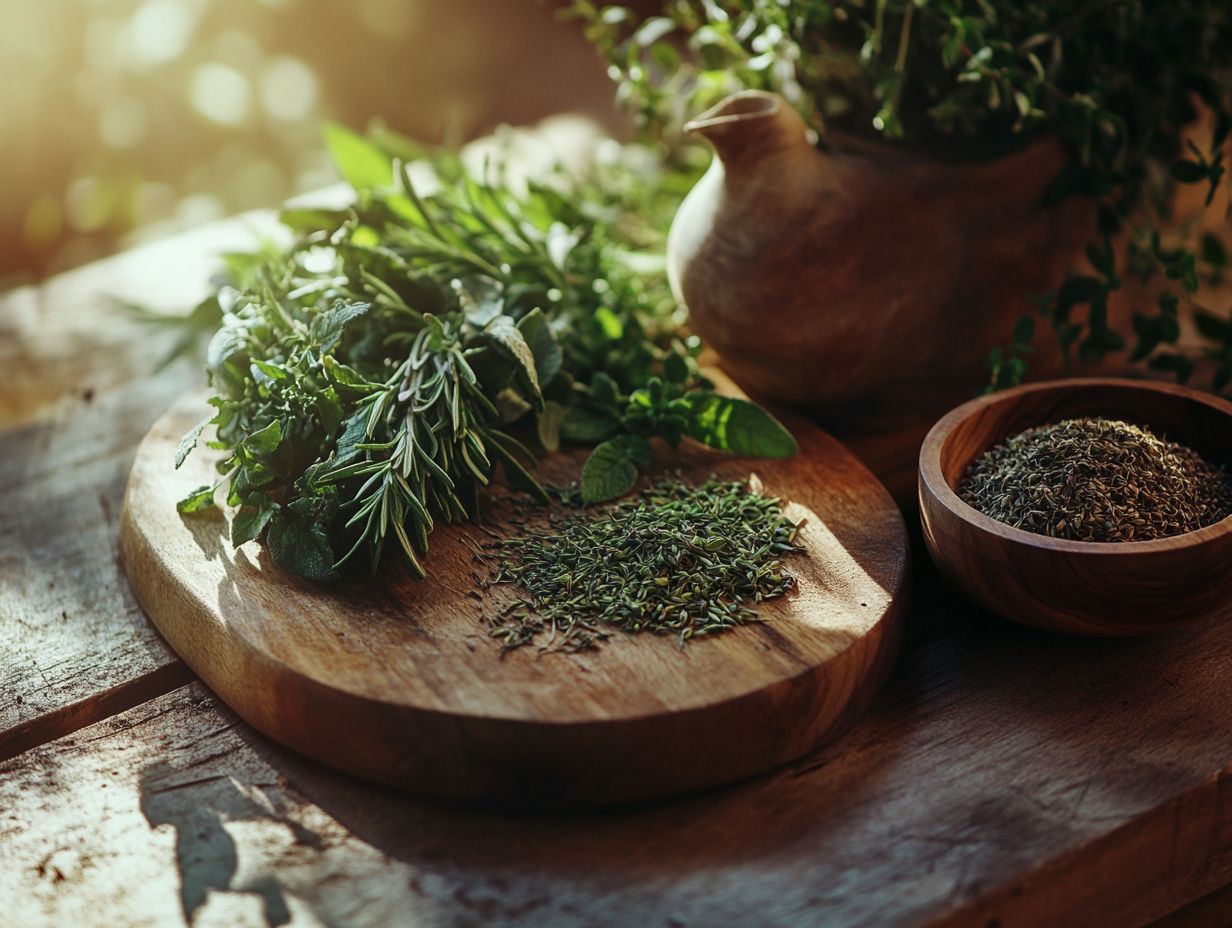
Consulting with a healthcare professional is essential before starting any new herbal treatments, particularly if you have specific health conditions or concerns about bone health.
A qualified expert can provide personalized advice, taking into account your unique health profile, dietary requirements, and any potential interactions with current medications.
This collaborative approach aligns dietary recommendations with your personal health goals and enhances the effectiveness of the herbal remedies you choose to incorporate.
In summary, incorporating herbs into your diet can significantly benefit your bone health while adding flavor and nutrition to your meals. Explore these options with enthusiasm and care!
When to Seek Advice and Guidance
Taking charge of your bone health is essential! Knowing when to reach out for help can make all the difference. Recognizing when to seek advice and guidance from a healthcare professional is crucial for maintaining optimal bone health, especially if you re at risk of osteoporosis, a condition that weakens bones and makes them more likely to break.
Be aware of other symptoms like persistent bone pain and unexplained fractures. Increased susceptibility to injuries or falls, significant weight loss, and a family history of bone health issues should all raise a red flag.
Taking action early is vital to prevent complications and empowers you to take proactive steps toward enhancing your wellness. Regular monitoring of bone density allows for timely adjustments to your dietary intake, ensuring you get adequate levels of calcium and vitamin D.
This proactive approach can lead to more effective lifestyle changes tailored to your unique health profile.
Frequently Asked Questions
Looking for herbs to boost your bone health?
Some herbs that are commonly used for bone health include nettle, horsetail, red clover, and oat straw. These herbs contain minerals such as calcium, magnesium, and silica that are important for maintaining strong bones.
Can herbs replace traditional medication for bone health?
No, herbs should not be used as a replacement for prescribed medication for bone health. Always consult with your healthcare provider before making any changes to your treatment plan.
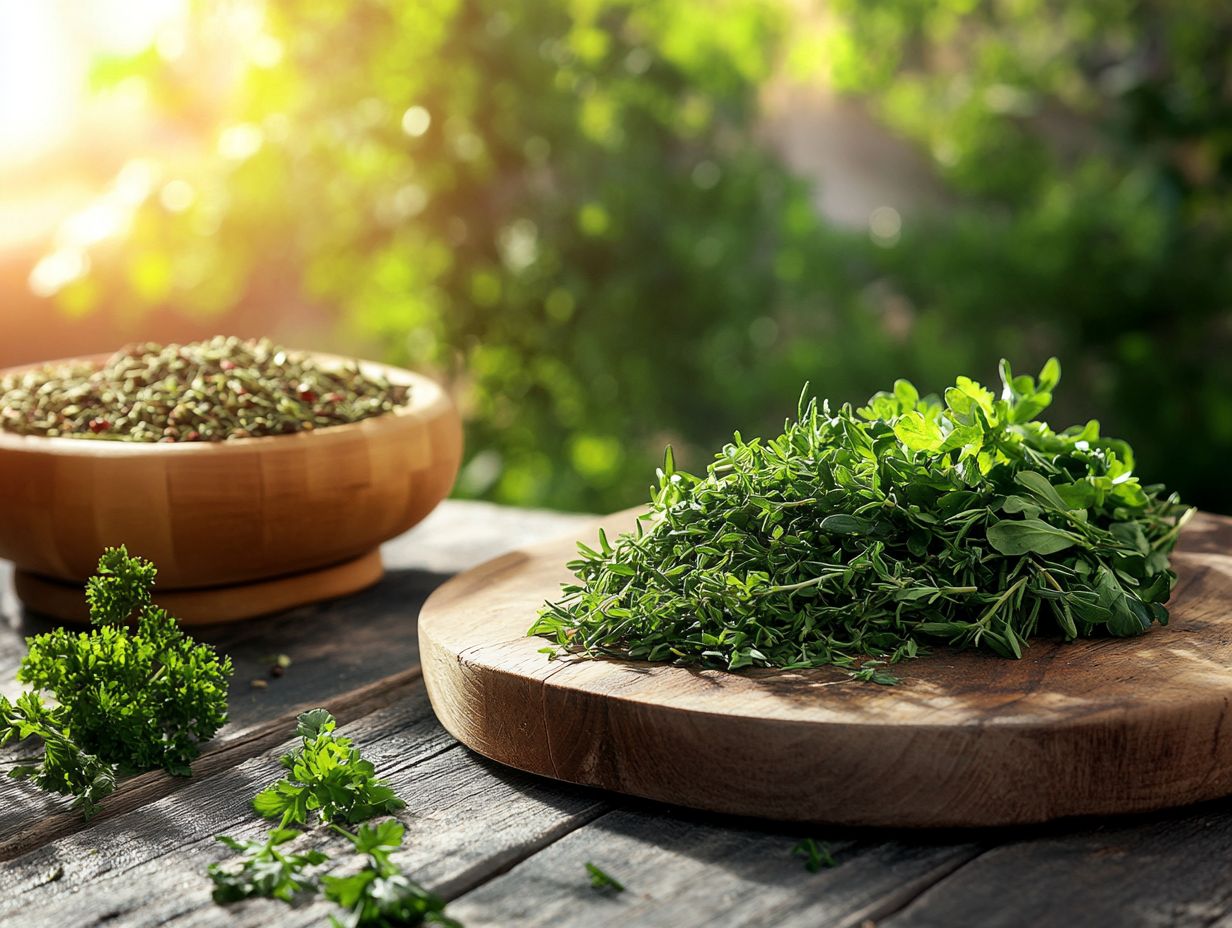
Are there any herbs to avoid for bone health?
Yes, some herbs can interact with certain medications or health conditions and should be avoided. This includes herbs like ginseng, ginger, and turmeric. It is important to speak with a healthcare provider before adding any new herbs to your regimen.
How can I incorporate herbs into my bone health routine?
Herbs can be consumed in various forms, such as teas, tinctures, or capsules. You can also incorporate them into your meals by adding fresh or dried herbs to your cooking. It is important to follow recommended dosages and consult with a healthcare provider if unsure.
Are there any side effects of using herbs for bone health?
While herbs are generally considered safe, they can cause side effects in some individuals. These may include stomach upset, allergic reactions, or interactions with medications. Always monitor for any adverse reactions and consult with a healthcare provider if needed.
Is it safe to use herbs for bone health during pregnancy or breastfeeding?
No, it is not recommended to use herbs for bone health during pregnancy or while breastfeeding without consulting with a healthcare provider first. Certain herbs may have contraindications, and it is important to ensure the safety of both the mother and baby.

